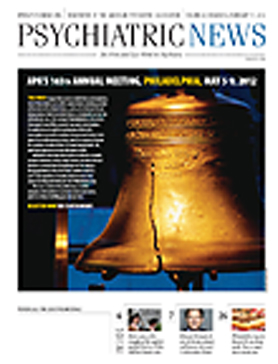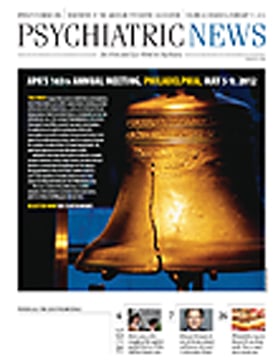At the Centennial meeting of APA in Philadelphia in 1944, the president of APA, Edward A. Strecker, M.D., said in his presidential address: “The American Psychiatric Association has gone to war on land and sea; in the air and beneath the surface of the ocean; in sodden jungles, on burning desert sands, and in arctic wastes; on the home front, in hospitals, clinics, and medical schools. … Practically every member not barred by age, disability, or earmarked as essential for civilian psychiatry is on active duty. In all branches of war service, the psychiatric policy and direction is overwhelmingly in the hands of members of this Association.”
What a remarkable time that must have been: a time of widespread hardship and high anxiety, of families bereft from casualties of war, yet a time of national heroes and a country galvanized into a determination of purpose shared by all. Today’s world is far more complex, yet we have had a new “Pearl Harbor” event— September 11, 2001—when, again, the psychiatric needs of our citizens were extreme, and the members of APA rallied as one voice to help our nation heal.
The challenge for our field, of course, is to chart a future-directed, shared sense of purpose, generating a sustained momentum of progress—one that does not require the motivational stimulus of catastrophe. And I believe that psychiatry is moving strongly and steadily toward that goal. One way to think about that progress is to look back at the scientific program of our 1994 meeting in Philadelphia, which marked APA’s Sesquicentennial, and see the strong advancement our field had achieved by that time. Jack McIntyre’s presidential theme was “Our Heritage, Our Future,” and I had the privilege to serve as chair of Jack’s Scientific Program Committee.
In his “From the President” column in the February 18, 1994, issue of
Psychiatric News, Jack highlighted a few features of the program, such as a series of sessions about
DSM-IV, which was published that year. Eighteen years later, as we return to Philadelphia in 2012, there will again be a series of sessions on
DSM, but this time on
DSM-5, incorporating new findings and clinical expertise (see
DSM Track Offers Attendees Penultimate Perspective).
Jack also wrote that there would be “sessions related to health care reform and its implications and potential for our field.” It would be interesting to revisit those discussions and compare them with what’s happening today! And, of course, in our meeting this coming May we’ll have many sessions on health care reform, in the context of our theme this year, “Integrated Care.” One example will be a presidential symposium chaired by Wayne Katon on “New Approaches to Integration of Mental Health and Medical Health Services,” which promises to be truly outstanding (see
Learn More About Integrated Care Through Special Track).
Ken Silk has done a wonderful job as chair of the Scientific Program Committee this year, working with outstanding committee members and with Debbie Hales and other APA staff; the result is a rich and diverse menu. And the steady scientific progress in our field is unquestionable. Take a look at the preliminary program, and you’ll see what I mean.
Frontiers of Science lecturers include Marsha Linehan, Helen Mayberg, Peter Fonagy, John Krystal, and Kesh Keshavan; special lectures are planned by Kay Redfield Jamison, Sherwin Nuland, Michael Porter, Sir Michael Rutter, Sabine Herpertz, Judge Steven Leifman, and many others, including the Adolph Meyer Award Lecture by Eric Kandel. Distinguished Psychiatrist lecturers include Mayada Akil, Steve Hyman, Ned Kalin, David Kupfer, Carol Tamminga, and Tim Walsh. Other special features include presidential symposia on “Mindfulness-Based Practices in the Treatment of Stress and Psychiatric Illness” chaired by Kathy Sanders; “Teaching Psychodynamic Psychiatry in the 21st Century,” chaired by Carol Nadelson; and “Prevention in Geriatric Psychiatry,” chaired by Dilip Jeste.
The “Advances In …” series will focus on child psychopharmacology, addiction psychopharmacology, PTSD, motivational interviewing, and mentalization-based therapy, and there will be many master courses, special sessions for residents and ECPs, and more. (see
Scientific Sessions and Events for Residents and Fellows )
I am extremely pleased, as well, that our Convocation lecture will be presented this year by Ted Kennedy Jr., who is passionate about the needs of individuals with visible and invisible disabilities. And, as you no doubt have read already, we’ll have a unique component of our Opening Session, called “Cognitive Therapy and Psychodynamic Therapy: More Alike Than Different? A Conversation Between Aaron Beck and Glen Gabbard.” A session not to be missed! (see
Beck, Gabbard to Probe Two Forms of Psychotherapy)
I’m getting too long-winded here, but you can see that I’m excited about the program and about being back in Philadelphia. Let me close with a reminder that Philadelphia was the home of the “father of modern psychiatry,” Benjamin Rush, one of the five physician signers of the Declaration of Independence and the author of
Medical Inquiries and Observations of the Mind in 1812. To quote Walter Barton in his volume on the history of APA, “Rush believed that mental illness was a disorder of the total person, with an origin in bodily impairment and in emotionally stressful events.” Sounds like “integrated care” to me! As is so often the case, the wisdom to find our way forward can be found in the wisdom of the past, helping clarify and simplify our rapidly accelerating world.



